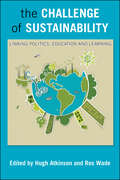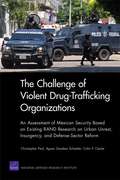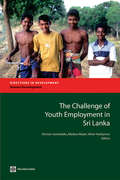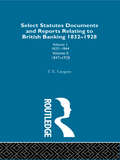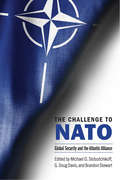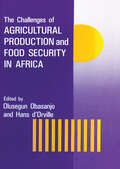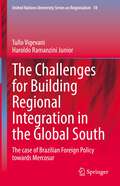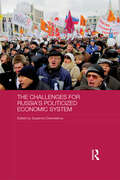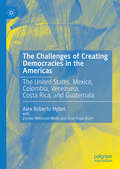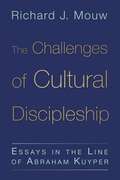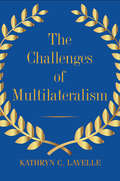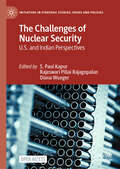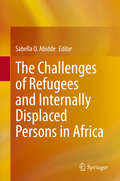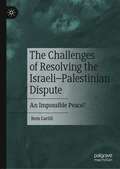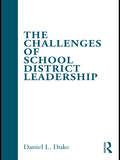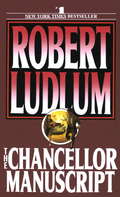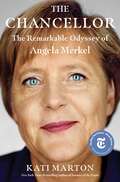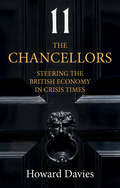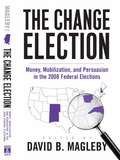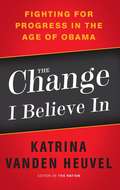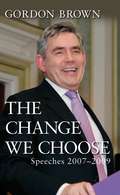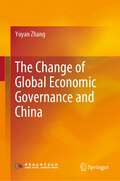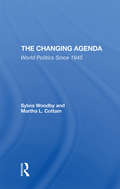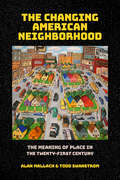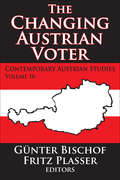- Table View
- List View
The Challenge of Sustainability: Linking Politics, Education and Learning
by Hugh Atkinson and Ros WadeThis timely and accessible book explores the links between politics, learning and sustainability. Its central focus is the future of people and the planet itself. The challenges that we face in combatting climate change and building a more sustainable world are complex and the book argues that if we are to successfully meet these challenges we need a fundamental change in the way we do politics and economics, embedding a lifelong commitment to sustainability in all learning. We have no option but to make things work for the better. After all, planet earth is the only home we have! The book will be important reading for academics and students in a variety of related subjects, including politics, public policy, education, sustainable development, geography, media, international relations and development studies. It will also be a valuable resource for NGOs and policy makers.
The Challenge of Violent Drug-Trafficking Organizations
by Christopher Paul Agnes Gereben Schaefer Colin P. ClarkeA RAND team conducted a Delphi expert elicitation exercise, the results of which offer an assessment of the contemporary security situation in Mexico through the lens of existing RAND research on urban instability and unrest, historical insurgencies, and defense-sector reform. Assessment scorecards from these projects were used to obtain input from the expert panel and to guide the resulting discussion.
The Challenge of Youth Employment in Sri Lanka
by Ramani Gunatlilaka Milan Vodopivec Markus MayerSri Lanka has long been regarded as a model of a successful welfare state in a low-income setting, yet it has not succeeded in creating a sufficient number of "good jobs" for the increasing number of young people. Hence, young Sri Lankans perceive their country as an unjust and unequal society, in which mainstream institutions have failed to address inequalities in the distribution of resources, as well as of benefits deriving from economic growth. Against this background, 'The Challenge of Youth Employment in Sri Lanka' aims to identify ways to improve the opportunities available to new job market entrants by addressing existing inequalities and to help young people more fully realize their potentials. Drawing from original research and a review of existing studies, the authors use the "4Es" conceptual framework to analyze four key aspects of labor markets-employment creation, employability, entrepreneurship, and equal opportunity-identifying main issues and results, current trends, and possible new approaches.
The Challenge to Friendship in Modernity
by Heather Devere Preston KingIn antiquity, it was not only Aristotle who assumed the people are more to be understood in relation to one another than as individual or solitary constructs. This examination considers the changing attitudes to friendship since antiquity.
The Challenge to NATO: Global Security and the Atlantic Alliance
by Michael O. Slobodchikoff G. Doug Davis Brandon StewartThe post–Cold War order established by the United States is at a crossroads: no longer is the liberal order and U.S. hegemonic power a given. The Challenge to NATO is a concise review of the North Atlantic Treaty Organization (NATO), its relationship with the United States, and its implications for global security. Despite seeing its seventieth anniversary in 2019, NATO faces both external and internal threats to its continued survival. This volume examines the organization&’s past, its current regional operations, and future threats facing the Atlantic Alliance, with contributions by well-known academics, former central figures within NATO, and diplomats directly involved in NATO operations. In this volume, Michael O. Slobodchikoff, G. Doug Davis, and Brandon Stewart bring together differing perspectives and orientations to provide a complete understanding of the future of the Atlantic Alliance.
The Challenges Of Agricultural Production And Food Security In Africa
by Olusegun Obasanjo Hans D'Orville Hans D’OrvilleThe agricultural and rural crisis besetting Africa is the result of both policy failures and inadequacies and the product of structural rigidities inhibiting access to and control of vital resources. The challenge of leadership in the agricultural sector is how to design and implement policies which would help induce growth and development in this sector. It is against this background that the Africa Leadership Forum convened in Ota, Ogun State, Nigeria in July of 1989 to explore a broad range of parameters to be addressed in the formulation of successful policies. This volume is derived from papers submitted and presentations made. The book provides the main conclusions and recommendations which emanated from the conference. They highlight a series of actions which must be taken in such areas as women in agriculture, small-scale farmers, agribusiness, subsidies, human capital, and linkages between international and national research anbd energy. Other topics include - Africa's security situation; social and economic factors, ecology, and social engineering; dietary patterns in Africa; pest management; agricultural practice; and international organizations. It is aimed at economists, anthropologists, ecologists, agriculturalists, social and political scientists, and all those interested or involved in agricultural production in Africa and other underdeveloped countries.
The Challenges for Building Regional Integration in the Global South: The case of Brazilian Foreign Policy towards Mercosur (United Nations University Series on Regionalism #18)
by Tullo Vigevani Haroldo Ramanzini JuniorThis book analyzes regional integration in South America with a focus on the Mercosur and Brazilian foreign policy from the 1990s. It reviews the history of the Mercosur and identifies the results achieved by the bloc, as well as the causes of difficulties and the reasons for stalemates over nearly 30 years of its existence. The authors identify the complex interrelation between domestic and foreign factors that have shaped Brazilian foreign policy. From 1991 onwards, relations between Latin American countries have changed while the Mercosur developed from a free trade area to a customs union. While intrabloc trade grew, there were huge difficulties in the form of regional institutional affirmation and cooperation. This history is of the utmost importance to understanding regionalism and politics in Latin America. The book therefore has two interrelated analytical dimensions: namely, focus on ideas and identity; and behavior, actions, and economic and political interests. This very topical book is of interest for researchers and students of Brazilian foreign policy and those of Latin American and/or Mercosur countries. Particularly, readers interested in regionalism will find important theoretical and empirical elements in this book, as well as discussions necessary for comprehending the role of big, emerging countries, and the potential and limits to their international role.
The Challenges for Russia's Politicized Economic System (Routledge Contemporary Russia and Eastern Europe Series)
by Susanne OxenstiernaDuring the early 2000s the market liberalization reforms to the Russian economy, begun in the 1990s, were consolidated. But since the mid 2000s economic policy has moved into a new phase, characterized by more state intervention with less efficiency and more structural problems. Corruption, weak competitiveness, heavy dependency on energy exports, an unbalanced labour market, and unequal regional development are trends that have arisen and which, this book argues, will worsen unless the government changes direction. The book provides an in-depth analysis of the current Russian economic system, highlighting especially structural and institutional defects, and areas where political considerations are causing distortions, and puts forward proposals on how the present situation could be remedied.
The Challenges of Creating Democracies in the Americas: The United States, Mexico, Colombia, Venezuela, Costa Rica, and Guatemala
by Alex Roberto HybelThis book’s leading goal is to explain why some states in the Americas have been markedly more effective than others at forming stable democratic regimes. The six states analyzed are the United States, Mexico, Colombia, Venezuela, Costa Rica, and Guatemala. The study identifies the critical challenges each state encountered at different stages of its state-creation and regime- formation processes, from the colonial period to the present. In its concluding chapter, the study presents a series of time-related hypotheses designed to capture the different evolutionary processes and explain variances in success.
The Challenges of Cultural Discipleship: Essays in the Line of Abraham Kuyper
by Richard J. MouwRichard J. Mouw is well known for his incisive views on the intersection of culture and Christianity and for his efforts to make the thought of major Dutch theologian Abraham Kuyper accessible to average Christians. In this volume Mouw provides the scholarly "backstory" to his popular books as he interprets, applies, expands on -- and at times even corrects -- Kuyper's remarkable vision for faith and public life.In thirteen essays Mouw explores and develops the Kuyperian perspective on key topics in Christian cultural discipleship, including public theology, sphere sovereignty, education, creation, and more. He deftly articulates an ecumenically enriched neo-Calvinist -- or "neo-Kuyperian" -- perspective that appropriates and contextualizes the ideas and insights of this important theologian and statesman for new challenges in Christian thought and service.
The Challenges of Multilateralism
by Kathryn C. LavelleMultilateralism has long been a study of contrasts. Nationalist impulses, diverging and shifting goals, and a lack of enforcement methods have plagued the international organizations that facilitate multilateralism. Yet the desire to seek peace, reduce poverty, and promote the global health of people and the planet pushes states to work together. These challenges, across time and the globe, have brought about striking, yet diverging, results. Here, Kathryn Lavelle offers a history of multilateralism from its origins in the nineteenth century to the present. Lavelle focuses on the creation and evolution of major problem-solving organizations, examines the governmental challenges they have confronted and continue to face from both domestic and transnational constituencies, and considers how non-governmental organizations facilitate their work. Comprehensive, accessible, and narrative-driven, The Challenges of Multilateralism should appeal to students with interests in global development, public health, trade, international finance, humanitarian law, and security studies.
The Challenges of Nuclear Security: U.S. and Indian Perspectives (Initiatives in Strategic Studies: Issues and Policies)
by S. Paul Kapur Rajeswari Pillai Rajagopalan Diana WuegerThis Open Access volume assembles experts from the United States and India to examine six issues essential to the safety and security of nuclear facilities, technologies, and materials: insider threats, organizational culture, emergency response, physical protection, control of radioactive sources, and cyber security. Each chapter includes papers by an Indian expert and by an American counterpart. This unique structure contrasts the countries’ diverse perspectives on nuclear security, situates technical problems within larger socio-political contexts, and identifies cooperative opportunities for the U.S. and India.
The Challenges of Refugees and Internally Displaced Persons in Africa
by Sabella O. AbiddeThis book discusses the phenomena of refugees and internally displaced persons (IDP) across several African countries. There are 40 million IDP worldwide; of these, an estimated 12.6 million are in 37 of Africa’s 55 countries. Written by a team of fifteen scholars across four continents, this book uses both quantitative and qualitative data to analyze the causes and consequences of this displacement, the role of the state in creating and mitigating these situations, and potential policy solutions. The volume is divided into three sections. Chapters in Section 1 discuss the causes of displacement. Chapters in Section 2 discuss refugees in their regional context. Chapters in Section 3 discuss IDP camps in Kenya, Nigeria, and Ghana. Bringing scholarly analysis to address two humanitarian crises, this book will be useful to students and researchers interested in African politics, forced migration, and policy as well as members of the diplomatic corps, governmental, and non-governmental organizations actively working towards solving these challenges.
The Challenges of Resolving the Israeli–Palestinian Dispute: An Impossible Peace?
by Bren CarlillThis book explains why the Israeli–Palestinian dispute is so difficult to resolve by showing that it consists of multiple distinct conflicts. Because these tend to be conflated into a single conflict, attempts at peace have not worked. Underpinned by conflict theory, observations of those involved and analyses of polling data, the book argues that peace will not be possible until each of the dispute’s distinct conflicts are managed.Early chapters establish a theoretical framework to explain and define the different conflicts. This framework is then applied to the history of the dispute. The actions and perceptions of Israelis and Palestinians make sense when viewed through this framework. The Oslo peace process is examined in detail to explain how and why each side’s expectations were not met. Ultimately, lessons in ways to build a future viable peace are drawn from the failures of the past.
The Challenges of School District Leadership
by Daniel L. DukeDespite the rising interest in school districts, there are relatively few comprehensive resources available for graduate students in educational leadership programs. The Challenges of School District Leadership takes the position that the best way to prepare the next generation of school district leaders is to make certain that they are prepared to address the unending challenges that characterize public education today. Drawing on the latest research as well as actual examples, the book spotlights ten of the perennial challenges facing superintendents and school boards. Among the challenges discussed in detail are balancing equity and excellence, accommodating demographic change, coping with the increasing politicization of district leadership, deciding how to organize (or reorganize) a school system, and meeting the demands of educational accountability. This text is appropriate for graduate students in educational leadership, education policy, and the politics of education as well as school district leaders.
The Chancellor Manuscript: A Novel
by Robert LudlumDid J. Edgar die a natural death?...or was he murdered?Inver Brass--a group of high-minded and high-placed intellectuals who see a monstrous threat to the country in Hoover's unethical use of his scandal-ridden private files. They decide to do away with him--quietly, efficiently, with no hint of impropriety. Until best-selling thriller writer Peter Chancellor stumbles onto information that makes his precious books like harmless fairy tales. Now Chancellor and Inver Brass are on a deadly collision course, spiraling across the globe in an ever-widening arc of violence and terror. Hurtling toward a showdown that will rip Washington's intelligence community apart--leaving only one damning document to survive . . . BONUS: This edition includes an excerpt from Robert Ludlum's The Bourne Identity.
The Chancellor: The Remarkable Odyssey of Angela Merkel
by Kati MartonThe definitive biography of German Chancellor Angela Merkel, detailing the remarkable rise and political brilliance of the most powerful—and elusive—woman in the world.The Chancellor is at once a riveting political biography and an intimate human story of a complete outsider—a research chemist and pastor&’s daughter raised in Soviet-controlled East Germany—who rose to become the unofficial leader of the West. Acclaimed biographer Kati Marton set out to pierce the mystery of how Angela Merkel achieved all this. And she found the answer in Merkel&’s political genius: in her willingness to talk with adversaries rather than over them, her skill at negotiating without ever compromising on what&’s most important to her, her canniness in appointing political rivals to her cabinet and exacting their policies so they have no platform to run against her, the humility to allow others to take credit for things done in tandem, the wisdom to stay out of the papers and off Twitter, and the vision to take advantage of crises to enact bold change. Famously private, the Angela Merkel who emerges in The Chancellor is a role model for anyone interested in gaining and keeping power while holding onto one&’s moral convictions—and for anyone looking to understand how to successfully bridge huge divisions within society. No modern leader has so ably confronted Russian aggression, provided homes to over a million refugees, and calmly unified Europe at a time when other countries are becoming more divided. But Marton also describes Merkel&’s many challenges, such as her complicated relationship with President Obama, who she at one point refused to speak to. This captivating portrait shows a woman who has survived extraordinary challenges to transform her own country and return it to the global stage. Timely and revelatory, this great morality tale shows the difference an exceptional leader can make for the greater good of a country and the world.
The Chancellors: Steering the British Economy in Crisis Times
by Howard DaviesWhen the Treasury lost control of interest rates to the Bank of England in 1997, its status looked under threat. However, it quickly reasserted its power by dominating policymaking across Whitehall and diminishing other ministries in the process. It also successfully fought off attempts by Prime Ministers, from Blair to Johnson, to cut it down to size. In this fascinating insider account, based on in-depth interviews with the Chancellors and key senior officials, Howard Davies shows how the past twenty-five years have nonetheless been a roller-coaster ride for the Treasury. Heavily criticized for its response to the global financial crisis, and for the rigours of the austerity programme, it also ran into political controversy through its role in the Scottish referendum and the Brexit debate. The Treasury&’s dire predictions of the impact of Brexit have not been borne out. Redemption of a kind, though a costly one, came from its muscular response to the COVID crisis. Anyone with an interest in economic policymaking, in the UK and elsewhere, will find this a valuable and entertaining account.
The Change Election: Money, Mobilization, and Persuasion in the 2008 Federal Elections
by David B. MaglebyThe 2008 election was an extraordinary event that represented change at many levels. The candidates’ innovative campaigns changed how funds were raised, how voters were mobilized, and how messages were communicated through advertising and the internet. Parties and interest groups played their own important role in this historic election. In The Change Election, David Magleby assembles a team of accomplished political scientists to provide an in-depth analysis of this groundbreaking presidential election. These scholars through a set of compelling case studies examine the competition for votes in a dozen competitive House and Senate contests and for the White House in five states: Ohio, North Carolina, New Hampshire, Colorado, and New Mexico. Backed by a wealth of data, and extensive interviews, the contributors offer an up-close look at the interactions of candidates' individual skills and personalities with the larger political forces at work in the election year. The book offers insights into the rapidly evolving organizational and technical aspects of campaigning. The dramatic success Obama and other candidates had in raising money-especially from small donors-is addressed along with how money was raised and spent by the candidates, party committees, and interest groups competing for votes. Building on a tested methodology, The Change Election explores the interplay of money and electioneering. Magleby builds on more than a decade of prior studies to show the ways participants in our electoral process have adapted to statutory and judicial decisions and how the 2008 election has the potential to transform American electoral politics.
The Change I Believe In: Fighting for Progress in the Age of Obama
by Katrina Vanden HeuvelOn the night of the 2008 presidential election,Nationeditor Katrina vanden Heuvel spoke for many: "For the first time in decades, electoral politics became a vehicle for raising expectations and spreading hope. ” But, she cautioned, "We progressives need to be as clear-eyed, tough, and pragmatic about Obama as he is about us. ” Where I Standcollects vanden Heuvel’s commentaries and columns from the first years of the Obama administration, an era that has come to be defined by reform and reaction. In the wake of the economic crisis and challenges from the insurgent Tea Party movement, it is clear that it will take more than one election (and one person) to reshape American politics and repair the damage wreaked by a decade of calamitous conservative rule. Vanden Heuvel challenges the limits of our downsized political debate, arguing that timid incrementalism and the forces of money and establishment power that debilitate American politics will be overcome only by independent organizing, strategic creativity, bold ideas, and determined idealism.
The Change We Choose: Speeches 2007-2009
by Gordon BrownThe Change We Choose: Speeches 2007-2009 brings together the key speeches made by Gordon Brown during the first two and a half years of his premiership. It reflects how the values and beliefs that have defined his political career have shaped his response to what have been arguably some of the greatest challenges ever to have faced a new prime minister.The speeches in this book trace what will be seen by historians as an extraordinary era in British and international history. We can learn a lot about his premiership by looking at the Prime Minister's penetrating and insightful speeches in this period, as he sets out his thinking on domestic and foreign policy and responds to the events that have shaped his time in office. We also learn much about Gordon Brown, the man, from the insights of those who have kindly agreed to contribute introductions - and from the person who knows him best of all: his wife, Sarah, who introduced his party conference speeches.
The Change of Global Economic Governance and China
by Yuyan ZhangThis book focuses on global economic governance covering the following five areas: the theoretical and historical evolution of global economic governance, international financial governance, international trade and investment governance, global climate change and sustainable development governance, and international macroeconomic policy coordination. On the one hand, this book aims to provide a general analytical framework for studying global economic governance. On the other hand, the study on global economic governance involves understanding its historical development, exploring its emergence and evolution, analyzing what challenges global economic governance faces in the context of a new globalization, looking into its future development trends, and proposing the direction of the reform of global economic governance system on the above basis, and finally providing theoretical references and policy advice for China’s better participation in global economic governance.
The Changing Agenda: World Politics Since 1945
by Sylvia Babus Woodby Martha CottamThis book provides an organized overview of the changing agenda of world politics since 1945, presenting economic and social issues where that seemed appropriate, even when little action was taken about them and exploring OPEC as an example of the use of producer associations.
The Changing American Neighborhood: The Meaning of Place in the Twenty-First Century
by Todd Swanstrom Alan MallachThe Changing American Neighborhood argues that the physical and social spaces created by neighborhoods matter more than ever for the health and well-being of twenty-first-century Americans and their communities. Taking a long historical view, this book explores the many dimensions of today's neighborhoods, the forms they take, the forces and factors influencing them, and the people and organizations trying to change them. Challenging conventional interpretations of neighborhoods and neighborhood change, Alan Mallach and Todd Swanstrom adopt a broad, inter-disciplinary perspective that shows how neighborhoods are messy, complex systems, in which change is driven by constant feedback loops that link social, economic and physical conditions, each within distinct spatial and political contexts. The Changing American Neighborhood seeks to understand neighborhoods and neighborhood change not only for their own importance, but for the insights they offer to help guide peoples' efforts sustaining good neighborhoods and rebuilding struggling ones.
The Changing Austrian Voter
by Cesare PaveseCompared to the late 1970s, when the Austrian voting behavior was characterized by extraordinary stability, low electoral volatility, and high turnout rates, the 1980s and 1990s stand for exceptional changes and ruptures elicited primarily by the rise of the right wing populist FPi (Freedom Party of Austria). This volume of collected papers investigates the permanent changes of Austrian voting behavior over the past forty years and analyzes causes and consequences for party competition and the electoral process in Austria during the first decade of the twenty-first century.Some of the contributions include Oliver Rathkolb's wide-ranging historical typology which addresses the Austrian voters in the twentieth century from the perspective of expanding voting laws and the struggle for political participation and integration. Based on compact trend data of Austrian Election Studies, Fritz Plasser and Peter A. Ulram present an empirical overview of trends and patterns in Austrian voting behavior covering the period from 1970 to 2006. Both the rising electoral volatility and the permanent increase of constant non-voters since the 1980s are dealt with. The development and dynamics of regional elections in Austria since the mid-1980s are reconstructed and related to the electoral behavior on the federal level.Kurt Richard Luther analyzes electoral strategies and the rise and fall of Austrian right wing populism from 1986 to 2006, focusing in particular upon changing styles of electoral mobilization. The media's role in framing the Austrian campaign discourse and the specific characteristics of campaign coverage in Austria are also in focus. This well-conceived volume also contains review essays, book reviews, and the annual review of Austrian politics. A mandatory selection for the bookshelves of all those interested in Austria or European Studies, this book provides invaluable information regarding the electoral process in Austria.
